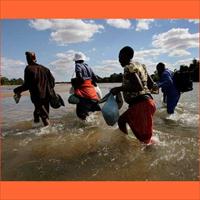SENEGAL: Flooding spreads as rains continue

Thousands have been affected by flooding in more than 40 neighbourhoods across Senegal, including 21 Dakar suburbs according to the Senegalese fire rescue services. AFP has reported at least one drowning.
Dakar neighbourhoods affected include Pikine, Guédiawaye, Thiaroye and Diamaguène, according to Mayé Konate, spokesman the National Association of Firefighters.
Rainfall is up by 70 percent compared to the first week in September 2007, according to the Senegalese Meteorological Organization. Drainage canals across the capital are full, said Konate.
On 4 September the government launched a national emergency response strategy, directing US$650,000 to water pumping in submerged neighbourhoods. Up to 60 rescue teams are now pumping water from the streets into canals, ponds or directly into the sea, according to Prime Minister Shekih Hadjibou Soumaré.
During his tour of flooded areas, Soumaré told reporters "Following more heavy rains in recent days there remains much more to be done [to help flooded neighbourhoods]. I call on everyone, including the private sector to help the state in preparingfor further floods.”
Angry victims
In Pikine, one of the worst-affected areas, on 6 September citizens protested against what they saw as the government’s inadequate response by upturning two public transport buses, leading local authorities to position police in front of government buildings.
Many families here were forced to flee their homes and shelter in the local school. During past flooding, schools throughout the country have been turned into official temporary shelters receiving government help but this year, “this must be the last option,” Interior Minister Cheikh Tidiane Sy, announced on 6 September.
The prime minister has pledged help is on the way, but has not specified when. "I am aware of their demands…The government, with its partners inside and outside of the country, will bring relief to these people in flooded areas."
The International Federation of the Red Cross (IFRC) is delivering emergency supplies to some 50 families displaced in these schools, while non-governmental organisations such as Islamic Relief are delivering food parcels to affected families.
But Youcef Ait Chellouche, disaster management coordinator at the IFRC, warns the problems are only beginning. “We need to be ready for potential epidemics – like cholera – to break out as the water starts to subside. We are closely monitoring this situation.”
Flooding worsened a cholera epidemic already underway in Dakar in 2005, which eventually infected more than 23,000 people.
 Back and Next - Back and Next
Back and Next - Back and Next See Also - See Also
See Also - See Also